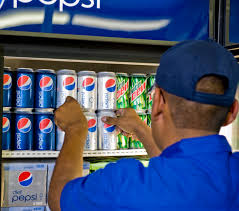
Source: www.pepsi.com.
Global snack-food and beverage concern PepsiCo (PEP 0.49%) reported third-quarter 2015 earnings Tuesday of $0.36 per share, versus $1.32 per share in the comparable prior-year period. Revenue declined 5.4% to $16.3 billion, and net income fell sharply because of a $1.4 billion charge against operations in Venezuela, to $533 million. In the third quarter of 2014, PepsiCo achieved net income of $2.0 billion. Let's review the earnings writedown as well other highlights from today's report.
PepsiCo solves a nagging issue -- how to deal with Venezuela
If a hyperinflationary economy weren't problem enough, multinationals such as PepsiCo have had to deal with capital controls imposed by Venezuela's government over the past few years, making it difficult to repatriate profits out of the country. In 2014, PepsiCo took a $105 million net charge to remeasure the value of its assets against Bolivar exchange rates tightly controlled by the Venezuelan government.
Last quarter, CFO Hugh Johnston noted on the company's earnings call with analysts that Venezuela accounts for only 2% of PepsiCo's revenue and operating profit. Johnston also pointed out that the company's local operations in Venezuela are basically self-sufficient and, additionally, that PepsiCo didn't have any plans to add new capital to its operations there.
This quarter, those statements seem prescient, as PepsiCo has essentially de-consolidated its Venezuelan operations. This means that results of PepsiCo's local business, through subsidiaries and a joint venture, will no longer be included in regular income and operations.
Instead, PepsiCo will only record cash sales of inventory to the subsidiaries and joint venture, and any dividends it receives from these entities will be booked as operating income under the cost method of accounting.
What does it mean for shareholders? Significantly, this action reduces the complexity of understanding Latin American results from quarter to quarter, as Venezuela's ongoing inflation always tends to skew revenue results in this segment.
Perhaps most importantly, it removes management from the obligation of focusing on a perennial trouble spot that decades ago might have held much potential for the company but now has a negligible impact on PepsiCo's fortunes.
Other highlights: credible performance in North America Beverages
If we remove the effects of the Venezuelan charge against earnings, equal to $0.92 per share, and add back the effects of about $0.07 of miscellaneous one-time adjustments, PepsiCo's earnings per share are slightly ahead of Q3 2014, at $1.35 per diluted share, versus $1.32 per diluted share last year.
The company's North America Beverages, or NAB, segment, which at $5.3 billion in quarterly sales is PepsiCo's largest revenue stream, contributed tangibly to the positive results. This segment was formed after quarter two of this year, when management reshuffled its business divisions. NAB now consists only of U.S. and Canadian beverage sales, with Latin American beverages having been placed in the "Latin America" segment.
Unlike all other segments, with the exception of Frito-Lay North America, NAB grew revenue during the quarter, at a rate of 4%. NAB's sales are mostly denominated in U.S. dollars, so the segment wasn't subjected to a 12% foreign currency drag ,which paced a total company revenue decline of 5%.
Still, NAB's results were impressive -- organic revenue climbed 5%, and segment profit increased 14%. This performance indicates that the company is having some success in branching out into non-carbonated brands to leaven the impact of declining carbonated soft drink sales.
U.S. snacks also lifted the quarter's numbers
Similarly, Frito-Lay North America, or FLNA, exhibited a decent profit increase of 6%. The company attributed the profit boost to lower commodity input costs, as well as improved productivity from ongoing initiatives.
While its revenues are only two-thirds of the NAB segment, FLNA's high profitability tends to make it PepsiCo's highest contributor to net income when measured in absolute dollars. Boasting a $1.08 billion segment operating profit, such was the case this quarter.
Shareholders should make a cautious mental note for next quarter regarding FLNA, however. Revenue only increased by 1% this quarter, continuing a trend of slowing growth in 2015. FLNA finished 2014 with a 2.6% revenue increase, but it's on track for only a 1% revenue lift this year.
In all, as long as both NAB and FLNA continue to show even marginal revenue and profit growth, shareholders can maintain a level of comfort even against uncertainty in other business segments. Together, NAB and FLNA make up more than half of revenue and half of company profit in any given quarter.
In fact, year to date, domestic business has provided an offset to weak revenue and profit performance in Europe, Africa, Asia, the Middle East, and Latin America. Stateside strength means that management is confident enough to have kept current-year fiscal guidance intact with some minor tweaks.
Core earnings per share are slated to grow 9% this year in constant currency terms. And the company still intends to return about $9 billion to shareholders through dividends and share repurchases. At $6.2 billion in shareholder returns through the first three quarters of 2015, management has about two-thirds of this initiative already wrapped up.
Now all PepsiCo needs is for the greenback to finally weaken a bit. A bit of dollar depreciation would spark business and financial returns on other continents and perhaps provide some ammunition for a future positive earnings surprise.






